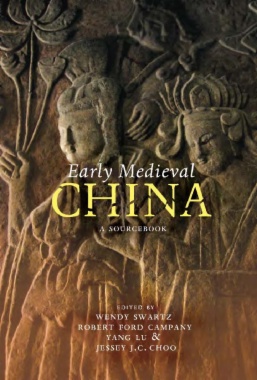This innovative sourcebook builds a dynamic understanding of China's early medieval period (220–589) through an original selection and arrangement of literary, historical, religious, and critical texts. A tumultuous and formative era, these centuries saw the longest stretch of political fragmentation in China's imperial history, resulting in new ethnic configurations, the rise of powerful clans, and a pervasive divide between north and south.
Deploying thematic categories, the editors sketch the period in a novel way for students and, by featuring many texts translated into English for the first time, recast the era for specialists. Thematic topics include regional definitions and tensions, governing mechanisms and social reality, ideas of self and other, relations with the unseen world, everyday life, and cultural concepts. Within each section, the editors and translators introduce the selected texts and provide critical commentary on their historical significance, along with suggestions for further reading and research.
- Table of Contents
- Chronological Contents
- Acknowledgments
- A Note on the Translations
- Abbreviations
- Introduction
- Part I. The North and the South by Jessey J. C. Choo
- 1. Return to the North? The Debate on Moving the Capital Back to Luoyang, by Jessey J. C. Choo
- 2. The Disputation at Pengcheng: Accounts from the Wei shu and the Song shu, by Albert E. Dien
- 3. Between Imitation and Mockery: The Southern Treatments of Northern Cultures, by Jessey J. C. Choo
- 4. Literary Imagination of the North and South, by Ping Wang
- Part II. Governing Mechanisms and Social Reality by Yang Lu
- 5. Managing Locality in Early Medieval China: Evidence from Changsha, by Yang Lu
- 6. Classical Scholarship in the Shu Region: The Case of Qiao Zhou, by J. Michael Farmer
- 7. Ranking Men and Assessing Talent: Xiahou Xuan’s Response to an Inquiry by Sima Yi, by Timothy M. Davis
- 8. On Land and Wealth: Liu Zishang’s “Petition on Closing Off Mountains and Lakes” and Yang Xi’s “Discussion on Abolishing Old Regulations Regarding Mountains and Marshes”, by Charles Holcombe
- 9. Crime and Punishment: The Case of Liu Hui in the Wei shu, by Jen-der Lee
- 10. Marriage and Social Status: Shen Yue’s “Impeaching Wang Yuan” , by David R. Knechtges
- 11. Religion and Society on the Silk Road: The Inscriptional Evidence from Turfan, by Huaiyu Chen
- Part III. Cultural Capital by Wendy Swartz
- 12. The Art of Discourse: Xi Kang’s “Sound Is Without Sadness or Joy”, by Robert Ashmore
- 13. Poetry on the Mysterious: The Writings of Sun Chuo, by Paul W. Kroll
- 14. The Art of Poetry Writing: Liu Xiaochuo’s “Becoming the Number-One Person for the Number-One Position”, by Ping Wang
- 15. Six Poems from a Liang Dynasty Princely Court, by Xiaofei Tian
- 16. Pei Ziye’s “Discourse on Insect Carving”, by Jack W. Chen
- 17. Classifying the Literary Tradition: Zhi Yu’s “Discourse on Literary Compositions Divided by Genre”, by Wendy Swartz
- 18. Zhong Rong’s Preface to Grades of the Poets, by Stephen Owen
- 19. Book Collecting and Cataloging in the Age of Manuscript Culture: Xiao Yi’s Master of the Golden Tower and Ruan Xiaoxu’s Preface to Seven Records, by Xiaofei Tian
- Part IV. Imaging Self and Other by Wendy Swartz
- 20. Biographies of Recluses: Huangfu Mi’s Accounts of High-Minded Men, by Alan Berkowitz
- 21. Classifications of People and Conduct: Selections from Liu Shao’s Treatise on Personality and Liu Yiqing’s Recent Anecdotes from the Talk of the Ages, by Jack W. Chen
- 22. The Literary Community at the Court of the Liang Crown Prince, by Ping Wang
- 23. Self-Narration: Tao Yuanming’s “Biography of the Master of Five Willows” and Yuan Can’s “Biography of the Master of Wonderful Virtue”, by Wendy Swartz
- 24. On Political and Personal Fate: Three Selections from Jiang Yan’s Prose and Verse, by Paul W. Kroll
- 24. On Political and Personal Fate: Three Selections from Jiang Yan’s Prose and Verse, by Paul W. Kroll
- Part V. Everyday Life by Jessey J. C. Choo and Albert E. Dien
- 26. Dietary Habits: Shu Xi’s “Rhapsody on Pasta”, by David R. Knechtges
- 27. The Epitaph of a Third-Century Wet Nurse, Xu Yi, by Jen-der Lee
- 28. Festival and Ritual Calendar: Selections from Record of the Year and Seasons of Jing-Chu, by Ian Chapman
- 29. Custom and Society: The Family Instructions of Mr. Yan, by Albert E. Dien
- 30. Adoption and Motherhood: “The Petition Submitted by Lady [née] Yu”, by Jessey J. C. Choo
- 31. Estate Culture in Early Medieval China: The Case of Shi Chong, by David R. Knechtges
- Part VI. Relations with the Unseen World by Robert Ford Campany
- 32. Biographies of Eight Autocremators and Huijiao’s “Critical Evaluation”, by James A. Benn
- 33. Divine Instructions for an Official, by Stephen R. Bokenkamp
- 34. Tales of Strange Events, by Robert Ford Campany
- 35. Texts for Stabilizing Tombs, by Timothy M. Davis
- 36. Reciting Scriptures to Move the Spirits, by Clarke Hudson
- 37. Confucian Views of the Supernatural, by Keith N. Knapp
- 38. Encounters in Mountains, by Gil Raz
- List of Contributors
- Index

